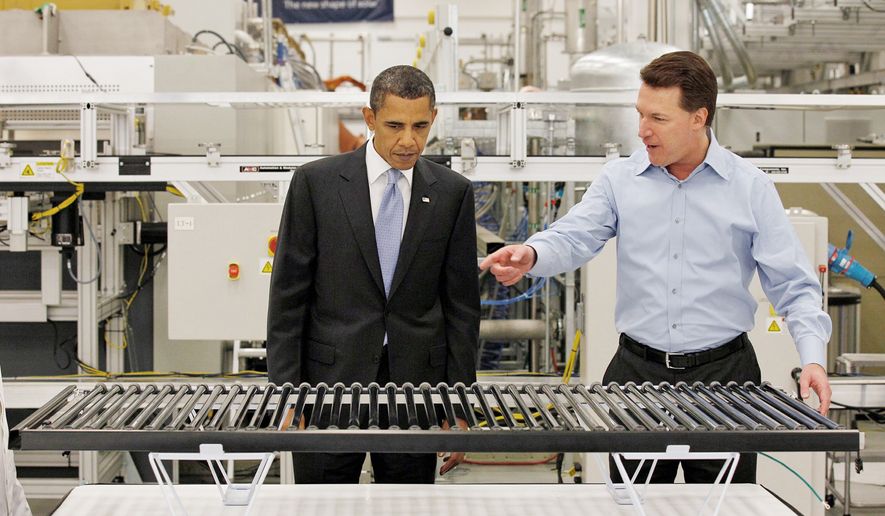Solyndra, the solar panel manufacturer who took more than $500 million from President Obama’s stimulus then went bust, sticking taxpayers for the loss, lied to federal officials to secure the loan, the Energy Department’s inspector general said in a report released Wednesday.
But the Obama administration goofed too, and may have cut corners in fully vetting the project because of “political pressure” from top Democrats and Solyndra itself, the investigators said in their report, which took four years to complete.
Most of the blame lies squarely on Solyndra, however. Investigators said company officials lied to the government and to independent market analysts and a credit-ratings agency, inflating the value of contract commitments in order to appear more financially promising.
Solyndra also claimed it could charge more than other solar panel manufacturers because its panels were less expensive to install, and built those higher prices into its plan. But it had knowingly oversold the premium it would be able to charge by as much as 65 percent, the inspector general said, skewing all of its financial calculations.
“At its core, Solyndra officials failed to make complete, accurate, and direct disclosures to the department of information that was relevant to the loan guarantee process,” the investigators said. “While the department’s due diligence effort had shortcomings, it is our view that providing misleading answers to departmental inquiries and failing to openly disclose critical information violated the spirit and intent of the requirement for Solyndra to report material changes to its loan guarantee application to the department.”
Solyndra became synonymous with government boondoggles during the early days of the Obama administration, when Mr. Obama was trying to manage the $800 billion stimulus package of tax cuts and new spending, designed to try to pull the economy out of a tailspin.
A large portion of the money was earmarked for the president’s favored areas, such as green energy projects, with the Energy Department pumping billions of dollars into its loan guarantee programs.
Those guarantees have been under scrutiny for years, and Solyndra, which went bankrupt in 2011, wasn’t the only one to go bust. The inspector general has previously found the office overseeing the guarantees was woefully understaffed, likely contributing to questionable loans being approved.
In Solyndra’s case, the company itself was most of the problem, lying to the office about its financial position.
But investigators said employees felt political pressure from the administration, Congress and Solyndra itself to approve the program.
Vice President Joseph R. Biden touted the Solyndra plant’s groundbreaking, addressing the event by video in 2009, and Mr. Obama himself visited the plant in 2010 to tout it as an example of his green energy plans, raising the stakes involved in the project.
Just months later, however, Solyndra admitted to the department it was in danger of collapse. Officials helped it restructure its plans, earning a new infusion of cash from investors — then it shuttered half a year later.
During its reviews, the loan office missed red flags that should have made it question whether the company was still viable. In one case, Solyndra substituted a new financial plan that showed it making projections, but the original numbers had been doctored. Employees would have caught the deception if they’d just looked back at the original submission, investigators said.
The Energy Department, in a statement, said it’s made improvements to the loan program since Solyndra failed, and said it’s now as rigorous as the private sector is in scrutinizing loan applications.
“The information in today’s report is consistent with the facts regarding the Solyndra bankruptcy that have been held up to public scrutiny over the past four years through the release of thousands of pages of documents, hours of testimony, and numerous reports. As the report says itself, ’the actions of the Solyndra officials were at the heart of this matter, and they effectively undermined the department’s efforts to manage the loan guarantee process,’” the department said.
The inspector general, though, said the loan guarantee program remains on the “watch” list, and further reviews are likely. Investigators said the department can learn more from the Solyndra debacle.
They recommended the department consider more “intrusive” tactics to try to puncture lies and misrepresentations such as those Solyndra gave.
“While many of its efforts in the loan guarantee arena have been successful in advancing new technologies and expanding energy markets, another experience similar to the Solyndra affair could seriously undermine the program and its goals, perhaps even leading to its termination,” the audit said.
• Stephen Dinan can be reached at sdinan@washingtontimes.com.
• Kellan Howell can be reached at khowell@washingtontimes.com.




Please read our comment policy before commenting.